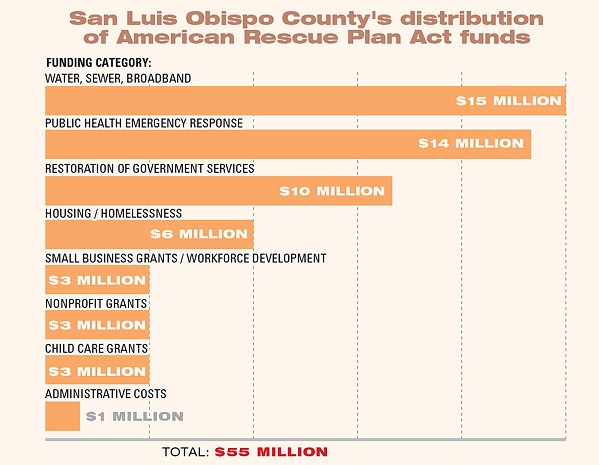[{
"name": "Ad - Medium Rectangle CC01 - 300x250",
"id": "AdMediumRectangleCC01300x250",
"class": "inlineCenter",
"insertPoint": "8",
"component": "2963441",
"requiredCountToDisplay": "12"
},{
"name": "Ad - Medium Rectangle LC01 - 300x250",
"id": "AdMediumRectangleCC01300x250",
"class": "inlineCenter",
"insertPoint": "18",
"component": "2963441",
"requiredCountToDisplay": "22"
},{
"name": "Ad - Medium Rectangle LC09 - 300x250",
"id": "AdMediumRectangleLC09300x250",
"class": "inlineCenter",
"insertPoint": "28",
"component": "3252660",
"requiredCountToDisplay": "32"
}]
In March, when San Luis Obispo County opened a window for local nonprofits to apply for COVID-19 recovery grants funded by the American Rescue Plan Act (ARPA), Big Brothers Big Sisters of SLO County CEO Jenny Luciano joined dozens of other nonprofit leaders in applying for aid.
The pandemic had taxed local youth and families in unimaginable ways, Luciano said, and Big Brothers Big Sisters did all it could during the crisis to enhance its youth mentoring program to help at-risk families.
"Throughout COVID, we heard over and over and over again that parents were struggling to maintain housing, that they needed resources for their children, mental health care, academic support for tutoring," Luciano said. "Our agency just felt an ethical responsibility to do everything that we could to transition to the online environment and provide families the support that they needed to stay afloat."
While groups like Luciano's stepped up during the pandemic, those efforts were expensive and often coincided with fundraising event cancellations and a decline in donations—leaving many in precarious financial states that persist to this day.
That's why nearly 60 local nonprofits jumped to apply for ARPA grants. The county set aside $3 million of the $55 million it had received in the stimulus package for the grants, offering a minimum of $25,000 per grant.
Many of those nonprofit applicants were "shocked" to see the final recommendations that came to the SLO County Board of Supervisors on May 17.
Only seven nonprofits received grant recommendations, and county administrators revealed that they made a late call to prioritize nonprofits that "address housing and homelessness''—even though $6 million in APRA funds were already earmarked for homelessness.
Several of the nonprofits poised to miss out on grants spoke at the May 17 meeting.
Those leaders argued that the county's formal request for applications (RFA) issued in March didn't mention that homelessness was a priority, and the decision to shift gears happened behind the scenes and after all the applications had been submitted.
According to the RFA, the grants' purpose was to provide "local assistance in the form of competitive grant funding for nonprofit organizations that responds to the negative economic impacts of the COVID-19 pandemic," and that "separate applications have been or will be released for child care, homeless, and economic development and business grants."
Michael Boyer, CEO of the Boys and Girls Club of the Central Coast, said the county's late hour change was unfair and demonstrated a lack of integrity.
"It was very shocking to us," Boyer told New Times. "I'm happy that any nonprofit gets the money; I'm more concerned with the process. It's about following the RFA you put out."
Boyer and others noted that if the county had been upfront about its priorities, they would have approached their applications differently.
"We serve kids on the edge of homelessness every day—our services prevent homelessness," Boyer said of the Boys and Girls Club's programs.
After the feedback, the supervisors voted unanimously to table the recommendations and directed county staff to revisit the grants. But the board still asked staff to make homelessness a priority.
"Homelessness is far and away the biggest issue we have in front of us," 2nd District Supervisor Bruce Gibson said.
The seven nonprofits initially recommended for funding included the Community Action Partnership of SLO County (CAPSLO), which was set to receive a high of $850,000 for outreach at safe parking sites, and Restorative Partners, which was slotted for $50,000—a group low—for job training and homelessness prevention at The Bridge Café, which will open inside the County Government Center.
Leaders at those nonprofits spoke to the board on May 17 about the importance of their grants to preserve or expand their services. ECHO CEO Wendy Lewis said that her recommended grant would help keep ECHO's new homeless shelter in Paso Robles up and running.
"If this recommendation doesn't move forward, we're going to have to critically look at reducing services," Lewis told the board. "The funding that was meant to support the project will be running out. And we don't want to look at going backwards."
Third District Supervisor Dawn Ortiz-Legg expressed regret for how the process played out. She serves on a subcommittee with 5th District Supervisor Debbie Arnold that provides oversight of the county's ARPA process.
"I take full responsibility. I had my fingerprints all over it. It's a kick to the gut," Ortiz-Legg told New Times. "We heard loudly and clearly the concerns of nonprofits, and rightly so. And we're now reviewing everything."
Luciano, with Big Brothers Big Sisters, said she knows that the supervisors are "fair-minded people" wanting to do the right thing. But she's disappointed with how the grants were handled, especially with so many nonprofits' futures on the line.
"To have that kind of backdoor decision making happen about the final outcome was really unfortunate," she said. Δ
Assistant Editor Peter Johnson can be reached at [email protected].
Latest in News
Readers also liked…
-

Coast Unified teachers upset over new position's salary and qualifications
Oct 20, 2022 -

SLO police identify alleged driver who hit and killed couple
Dec 22, 2022 -

When the levee breaks: Oceano residents, county officials walk a tightrope of regulations to manage Arroyo Grande Creek, which some say led to the levee's failure in January
May 18, 2023










